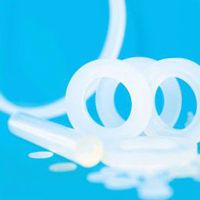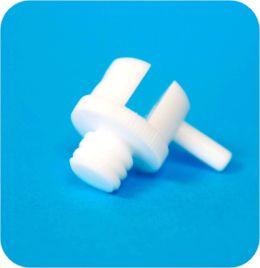[vc_row][vc_column][vc_column_text]
PCTFE Material (polychlorotrifluoroethylene)
Key features of PCTFE:
- Resistant to cryogenic temperatures
- Almost perfect waterproofing
- Good chemical stability
PCTFE or PTFCE is a fluoropolymer highly appreciated for its properties of very low gas permeability, chemical stability and low-temperature resistance. It is therefore a material of choice in industrial sectors such as aeronautics, cryogenics, and valve equipment manufacturers. The most common trade name is KEL-F but 3M has discontinued the production of KEL-F in 1996 and the Voltalef of Arkema is now the most common.
PCTFE or polychlorotrifluoroethylene is processed by compression molding or extrusion. This high-performance polymer is a fluorinated polymer close to PTFE with an additional chlorine atom, responsible for the low melt index. It is characterized by its high level of tensile strength and creep resistance. PCTFE also has excellent mechanical properties at cryogenic temperatures.
PCTFE also has excellent flammability resistance (flammability index is V0 according to UL94) and high moisture repellency. In addition, its coefficient of thermal expansion is low compared to PTFE. It therefore maintains good dimensional stability over a wide temperature range from – 240°C to + 150°C. In addition, this thermoplastic has virtually no moisture absorption property and is gas-impermeable. It remains intact, even under attack from certain active ingredients of certain chemicals and oxidizing agents, being free of hydrogen atoms. This PCTFE is BAM oxygen (gas) compatible.
PCTFE is transformed into bars, tubes, plates, but also into machined parts such as seals, valve seats, non-return seals, etc.
The trade names: Voltalef ®, Kel-F ®, Neoflon ®, Aclar ®, Halon ®, Fluon ®, Hostaflon ®, Plaskon ®.
Do you need more information? Contact us!
[/vc_column_text][/vc_column][/vc_row][vc_row el_class=”gridprod”][vc_column][vc_row_inner equal_height=”yes”][vc_column_inner width=”1/3″][vc_single_image image=”5759″ img_size=”full” alignment=”center”][/vc_column_inner][vc_column_inner width=”1/3″][vc_single_image image=”5758″ img_size=”full” alignment=”center”][/vc_column_inner][vc_column_inner width=”1/3″][vc_single_image image=”5756″ img_size=”full” alignment=”center”][/vc_column_inner][/vc_row_inner][/vc_column][/vc_row][vc_row][vc_column][vc_column_text]
Our other materials
[vc_row content_placement=”middle” css=”.vc_custom_1582391804648{padding-top: 50px !important;padding-bottom: 50px !important;background-image: url(https://www.plastiques-nobles.com/wp-content/uploads/2020/01/classification-des-matieres-plastiques-plastic-material.jpg?id=6188) !important;background-position: center !important;background-repeat: no-repeat !important;background-size: cover !important;}” el_class=”bandplastique”][vc_column][vc_column_text]
Need help finding your plastic?
Do not hesitate to use our search engine and our interactive pyramid.
[/vc_column_text][vc_btn title=”Find your plastic” align=”center” link=”url:%2Fplastic-classification%2F|||” el_class=”btn3″][/vc_column][/vc_row]
[vc_row full_width=”stretch_row” css=”.vc_custom_1579189110761{padding-top: 50px !important;padding-bottom: 40px !important;background-color: #f4f5f8 !important;}”][vc_column][vc_column_text]
A question, a quote?
Do not hesitate to contact us at +33 (0) 1 48 45 49 79 or via this form:
[/vc_column_text]
[/vc_column_text][/vc_column][/vc_row]





















